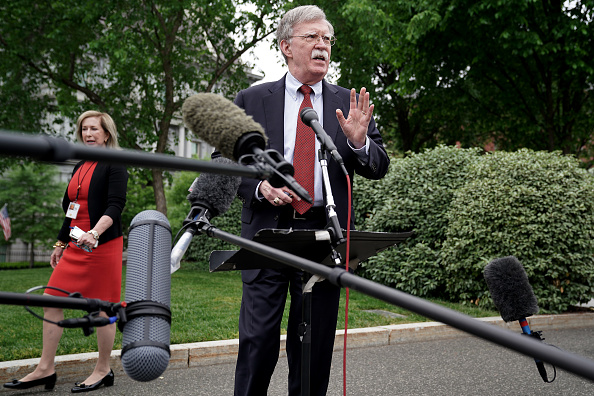US DEPLOYS CARRIER GROUP, CONTEMPLATES BOLSTERING GROUND TROOP PRESENCE
On May 14, Acting Defense Secretary Patrick Shanahan announced an updated military contingency plan outlining the deployment of nearly 120,000 U.S. troops to the Middle East, in the event of an Iranian attack on U.S. forces or sudden Iranian acceleration of nuclear weapons development. Commenting on Iranian policy broadly, President Trump said Monday, “If they do anything, they will suffer greatly. We’ll see what happens with Iran.”
This follows a May 5 decision by the White House to deploy an additional Carrier group to the Persian Gulf. Explaining the decision to dispatch the USS Abraham Lincoln Carrier Strike Group as well as a bomber task force to U.S. Central Command, National Security Advisor John Bolton announced that Washington’s goal was "to send a clear and unmistakable message to the Iranian regime that any attack on United States interests or on those of our allies will be met with unrelenting force."
According to U.S. officials, “specific and credible” threats to American military forces in Syria, Iraq, and the Gulf emanating from Iranian proxy groups prompted the buildup. Although details about the precise nature of these threats have yet to emerge, one official added, "There was enough information to indicate this had to be taken seriously."
Indeed, shortly after the decision was announced, four oil tankers, including two Saudi vessels, were damaged in a series of explosions in the Gulf. An initial U.S. intelligence assessment concluded that Iran was the likely culprit.
In such a context, April comments by senior Iranian military officials take on added salience. Last month, the IRGC Naval Force’s commander Alireza Tangsiri, threatened to close the Strait of Hormuz, according to state-run Fars news agency.

WASHINGTON DEBATES BROADER IMPLICATIONS
Officially, members of the Trump administration view the potential deployment of 120,000 troops and a carrier group as a prudent exercise in contingency planning. Secretary of State Mike Pompeo, speaking to reporters over the weekend, downplayed the move’s significance. The deployment was "something we've been working on for a little while." He added, "It is absolutely the case that we have seen escalatory actions from the Iranians and it is equally the case that we will hold the Iranians accountable for attacks on American interests."
Others, particularly current and former Democratic officials, find the implications of large scale military deployments deeply troubling. Colin Kahl, former National Security Adviser to Vice President Joe Biden, tweeted in response to the news, “No plausible contingency except invasion and regime change would require sending 120,000 U.S. forces to the Middle East.”
Democratic Senator Chris Murphy of Connecticut echoed this wary sentiment: “The one thing we learned from the last time we sent 120,000 American troops to the Middle East is don’t send 120,000 American troops to the Middle East,” he said.
Iranian officials, for their part, seemed content to reiterate strident warnings against American aggression. Hamid Baeidinejad, Iran’s ambassador to the United Kingdom, told reporters that the United States is playing a "very dangerous game" as it attempts to "drag Iran into an unnecessary war.”
According to Ali Vaez, director of the Iran program at the International Crisis Group, the American measures reflect Trump administration concerns as to whether the pressure campaign on Tehran will yield its hoped-for results. He notes, “Frustration is building up in Washington, as maximum pressure has produced minimum strategic results, and the clock is ticking.” In Vaez’s assessment, “[E]ither Iran digs in, prompting a frustrated White House to double down yet again on measures that alienate key allies and risk regional escalation,” or Iran opts for a more aggressive path “and decides to escalate further in the nuclear realm or in the region.”









